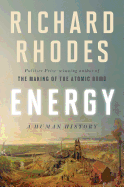
Richard Rhodes, author of The Making of the Atomic Bomb, turns his attention to the interplay of the development of modern technology and fuel sources in Energy: A Human History, which outlines not only how people discovered and perfected various sources of power, from the dawn of the industrial revolution to the present, but also why certain forms of fuel have become more common than others.
Spanning continents and centuries, Energy takes the reader from a time where wood was the chief source of fuel for Europe and the Americas to today, when oil, natural gas, nuclear power and renewable energy fight for supremacy. Rhodes uses each chapter of the book to focus on a different form of fuel or technology, showing that the need for one created the circumstances for invention in the other. For example, long before locomotive-driven trains became, for a time, the typical way humans traveled, steam engines were designed to help remove water from coal mines. The technology helped extract the fuel, which in turn was the source of the technology's power and led to applications in many other areas.
While Energy does delve a little into the physics and chemistry of various fuel sources and machines, it is less interested in science lessons than how each new technology and fuel interacted with the historical and cultural circumstances around it. There's a reason the subtitle of the book is "A Human History," especially in the final chapter where Rhodes contemplates climate change: fuel is fuel because it sparks industry and changes the way people live. --Noah Cruickshank, adult engagement manager, the Field Museum, Chicago, Ill.

